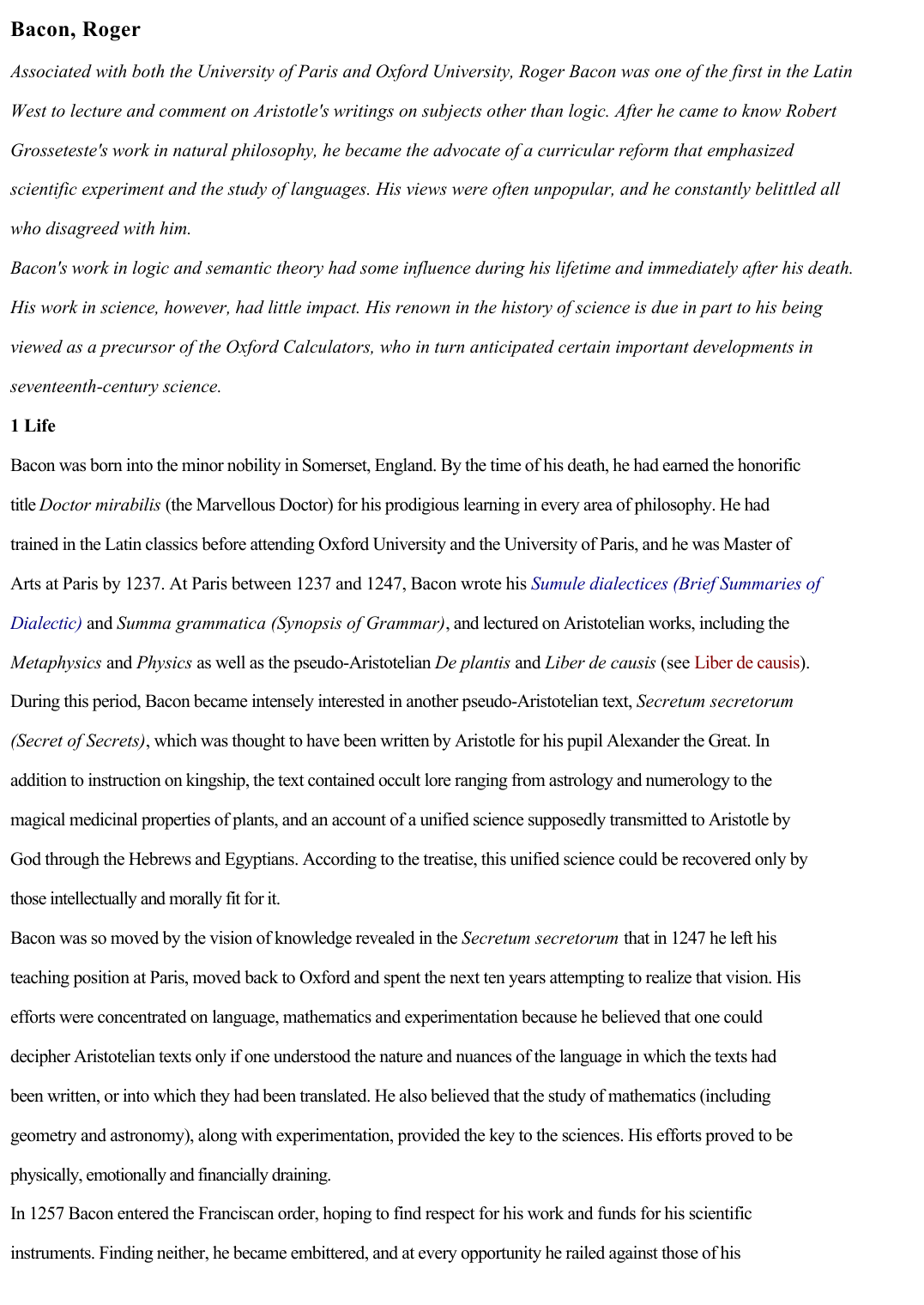Bacon, Roger
Publié le 16/05/2020

Extrait du document
«
Bacon, Roger
Associated with both the University of Paris and Oxford University, Roger Bacon was one of the first in the Latin
West to lecture and comment on Aristotle 's writings on subjects other than logic.
After he came to know Robert
Grosseteste 's work in natural philosophy, he became the advocate of a curricular reform that emphasized
scientific experiment and the study of languages.
His views were often unpopular, and he constantly belittled all
who disagreed with him.
Bacon's work in logic and semantic theory had some influence during his lifetime and immediately after his death.
His work in science, however, had little impact.
His renown in the history of science is due in part to his being
viewed as a precursor of the Oxford Calculators, who in turn anticipated certain important developments in
seventeenth-century science.
1 Life
Bacon was born into the minor nobility in Somerset, England.
By the time of his death, he had earned the honorific
title Doctor mirabilis (the Marvellous Doctor) for his prodigious learning in every area of philosophy.
He had
trained in the Latin classics before attending Oxford University and the University of Paris, and he was Master of
Arts at Paris by 1237.
At Paris between 1237 and 1247, Bacon wrote his Sumule dialectices (Brief Summaries of
Dialectic) and Summa grammatica (Synopsis of Grammar) , and lectured on Aristotelian works, including the
Metaphysics and Physics as well as the pseudo-Aristotelian De plantis and Liber de causis (see Liber de causis ).
During this period, Bacon became intensely interested in another pseudo-Aristotelian text, Secretum secretorum
(Secret of Secrets) , which was thought to have been written by Aristotle for his pupil Alexander the Great.
In
addition to instruction on kingship, the text contained occult lore ranging from astrology and numerology to the
magical medicinal properties of plants, and an account of a unified science supposedly transmitted to Aristotle by
God through the Hebrews and Egyptians.
According to the treatise, this unified science could be recovered only by
those intellectually and morally fit for it.
Bacon was so moved by the vision of knowledge revealed in the Secretum secretorum that in 1247 he left his
teaching position at Paris, moved back to Oxford and spent the next ten years attempting to realize that vision.
His
efforts were concentrated on language, mathematics and experimentation because he believed that one could
decipher Aristotelian texts only if one understood the nature and nuances of the language in which the texts had
been written, or into which they had been translated.
He also believed that the study of mathematics (including
geometry and astronomy), along with experimentation, provided the key to the sciences.
His efforts proved to be
physically, emotionally and financially draining.
In 1257 Bacon entered the Franciscan order, hoping to find respect for his work and funds for his scientific
instruments.
Finding neither, he became embittered, and at every opportunity he railed against those of his.
»
↓↓↓ APERÇU DU DOCUMENT ↓↓↓
Liens utiles
- Bacon Roger
- Roger Penrose, À la découverte des lois de l'Univers ( résumé)
- BABEL de Roger Caillois
- Commentaire de texte Roger Pouivet, Le réalisme esthétique (2006)
- Roger Hodgson


